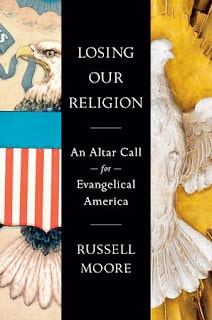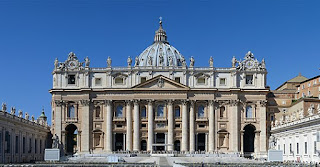More than once in these pages, I have quoted Russell Moore’s famous observation that the religious right has turned out to be the people the religious right warned us about. Moore previously served as the president of the Ethics and Religious Liberty Commission, the policy wing of the Southern Baptist Convention, and has since become the most prominent evangelical voice in opposition to Donald Trump. Currently, Moore is editor in chief of Christianity Today. Now, in his latest book, Losing Our Religion: An Altar Call for Evangelical America (Penguin, 2023), there is an analogous memorable phrase, referring to young people « walking away from evangelicalism not because they do not believe what the church teaches, but because they believe the church itself does not believe what the church teaches. » The problem Moore identifies « is not that people think the church’s way of life is too demanding, too morally rigorous, but that they have come to think the church doesn’t believe its own moral teachings. »
Losing Our Religion: An Altar Call for Evangelical America is largely a personal reflection on this experience (Moore having been until recently an insider in Southern Baptist circles), and a sort of spiritual diagnosis of the problem, a problem which, I suspect, applies to a greater or lesser degree to much of American Christianity. Much of that phenomenon has obviously been associated with the political effect of the evangelical alliance with Donald Trump, and Trump does indeed figure in this book, as he has in Moore’s public posture since Trump’s appearance on the political scene. But Trump is more the symptom than the cause of the problem Moore seeks to analyze and diagnose.
« Losing my religion, » the idiomatic southernism which gives the book its title, has to do with losing one’s patience, « when politeness gives way to anger. »
In Moore’s analysis, « confidence in the kingdom of Christ » ought to enable us « to stop looking for substitutes for him. » But, in their panic « about rising secularism and what they fear will be hostility to the church, » some « act in ways that tie the witness of the church to forms of power that actually fuel secularization. »
In Moore’s case, he has increasingly recognized « a dread deep within me that Christianity might just be southern culture of politics, with Jesus affixed as a hood ornament. »Whether the concern is « political idolatry or populist demagoguery or white nationalism or toxic masculinity » or whatever, the fact is « that as awful as all of those horrors are, they are made worse when they are framed as badges of religious identity. »
The wider context for all this is the rapid decline in American religious affiliation – from some 68% of American affiliated with a church or other religious body some 20 years ago to just 47% now. Moore seems to agree with those studies that suggest « that the politicization of American religion is a key driver of people away from religious affiliation. » He cites political scientist Daniel K. Williams, who calls, “Iapsed evangelical Protestants » the largest religious body in the South.” Williams has shown that these de-churched “evangelicals” are « liberalizing, to be sure, but only on the specific sins they want to commit. » Having left the Church, « they retain the moralism—at least insofar as it pertains to other people—but lose the sense of self-sacrifice and trust in others,” They also « lose whatever willingness they had to care for other people in community.” This is part of a larger phenomenon, in which almost any disconnection « from organic community leads to extremism and anger—no matter the place on the ideological spectrum. » (He illustrates this on the Left by recalling how leadership of leftist movements by labor unions and of civil right movements by pastors has given way to « de-churched Protestants, » who « are far more hyper-individualistic, cynical, and distrustful of others, » and are « also much more likely to be lonely, disconnected, suspicious of institutions, and angry. »
One of the dimensions of the crisis which Moore diagnoses is that « it is not just that we are divided about what we value about the way things should be, but what we are allowed to say about the way things actually are. Now, notice, what I wrote here is not what we see about the way things are, but what we are allowed to say. This is because we live in a time in which ‘truth’ is seen as a means to tribal belonging, rather than as a reality that exists outside of us. And that’s true even among, sometimes even especially among, those who spent the last twenty years arguing about the dangers of postmodern relativistic ideas of ‘truth’ and the rejection of metanarratives’.” Against all that, Moore reminds us « that bearing false witness is a sin, and that lying distorts not just the truth but us. »
Prescriptively, Moore makes recommendations aimed at recovering American Christianity’s evangelical heart. He reminds his readers that, while they’re a multiple experiences of legitimate authority, some revealed as embedded in creation, « Scripture is the final authority, the norm that norms all other norms. » This, of course, contrasts, with the contemporary phenomenon which political scientist Christopher Freiman calls the “monopolization of our identity by politics.” Moore also cites the research of Tobias Cremer in the use of Christianity in populist movements, in which otherwise unchurched people display Christian symbols, all of which represents “extreme form of a secularized Christianity” in which such concepts can serve as symbols of an imagined “white and masculine past.” (Here Moore specifically references « the Jesus Saves sign and other Christian symbols at the January 6, 2021, attack on the Capitol. »)
Moore characterizes such phenomena as « not a politically enthusiastic version of Christianity, nor is it a religiously informed patriotism. Christian nationalism is a prosperity gospel for nation-states, a liberation theology for white people. … Christian nationalism cannot turn back secularism, because it is just another form of it. »
One wholesome counter to all that lie sins he recognition that authentic Christianity is always global in its orientation. « White American Christians » Moore notes are neither a “moral majority” nor a “silent majority” nor « any majority at all, unless we define our primary culture as that of the United States of America. If, instead, our first identity is part of the global Body of Christ, then white middle-class Americans are a tiny sliver indeed, and the driving force of Christian orthodoxy and spiritual energy in the world, and even in the United States, is not white and middle-class. And where there is evangelistic energy within American evangelicalism, such is often centered in immigrant churches, whether Dominican or Cambodian or Nigerian or Iranian. » Much the same could be said of other Protestant denominations and of the Catholic Church.
In recent years, Moore has become perhaps the primary internal (i.e., within Christianity) critic of the tragic trajectory of much of American Christianity. This book is another valuable contribution to that much needed critique. His work serves as a wholesome reminder of the true means of evangelical. To evangelize, as Pope Saint Paul VI reminded Catholic Christians in 1975, is the essential mission of the Church. When Christians are evangelical in the true sense, they see their fellow countrymen as neighbors with whom the good news is to be shared. The choice to recognize America as a locus for mission is a religious choice. The choice to recognize America as a locus for culture war – and our neighbors as enemies in that war – is a political choice.




